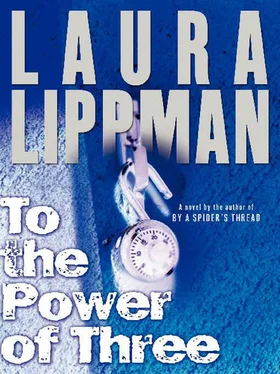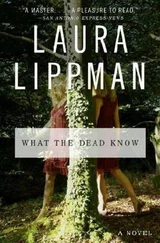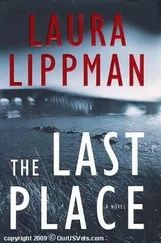And now she was dead, and Peter would never have the chance to make things right with her. He had been counting on that opportunity, he realized, banking on it. In the back of his head, he had always hoped to have a chance to make amends with Kat Hartigan.
On the way home from the Dairy Queen, Peter detoured by the school, but there was nothing to see out front, not even yellow crime-scene tape. They wouldn’t seal off the whole school, obviously. The tape was probably in back, where it had happened. He had managed to learn that much in the last forty-eight hours. Kat, shot to death in the girls’ room, Josie Patel wounded, Perri Kahn the suspect, although she was said to be pretty fucked up. In the Associated Press article that Peter had read in one of the New York tabloids, these names were rendered meaningless-for they were meaningless to whoever had written the account. But each one carried a world of significance for him. Perri, the drama queen. Josie, the little hanger-on. Kat-but he couldn’t sum up Kat in a word or two. Homecoming queen, A student, granddaughter of Glendale ’s founder-you could pile up as many words as you liked, but they didn’t get to the heart of Kat.
He still wasn’t ready to go back to his parents’ empty, quiet house. He decided to cruise past the community center, still ablaze with lights from some sort of show or recital inside. Peter parked his car and got out, leaning against it, enjoying the air. New York was great, but you couldn’t walk a block without smelling something foul, especially this time of the year, when garbage seemed to bake in the alleys. Here muted notes drifted on the summer breeze, but he couldn’t identify the tune. Was it the summer show? No, way too early. Those were always staged in July and August.
The community-theater program in Glendale was quite good, better than those NYU snobs would ever know, the final show as tight and professional as anything Peter had seen in college. Peter had done Godspell here, the summer he was eighteen, when he was college bound. He had worked as a lifeguard all day, then sung and danced every night, so he was tanned and cut, yet very thin, which suited the role of God’s only son. He had fans, honest-to-God groupies who had hung around this parking lot waiting for him to come out. Perri and Josie had been among them, even some of the redneck crowd. But not Kat, never Kat. He knew because he had asked her, after they started dating.
“I’m not the kind of girl who goes around falling in love with Jesus,” she had said. Kat could be droll that way. No one seemed to notice, because she was pretty and Perri was so famously mouthy, but Kat got some good lines off, in private. I’m not the kind of girl who goes around falling in love with Jesus.
Almost without thinking, Peter broke into the old soft shoe, the one from “All for the Best,” right there in the parking lot. This was the Act 1 number with Judas, the one that always killed. Yes, it’s all for the best. He still remembered all the moves, even the time step that the choreographer, a high-strung type, had almost despaired of Peter’s mastering.
Judas got all the best lines in that duet. But Jesus got the girls. Oh, yes, Kat Hartigan notwithstanding, Jesus got all the girls.
Thirty years ago,back when Thornton Hartigan was still wondering if he would ever find developers and investors for the acreage he had acquired so stealthily, a New York couple bought a large, run-down farm in the nearby Monkton area. Harvey Bliss and Sylvia Archer-Bliss were the kind of people described by their new neighbors as artsy, which is to say they wore a lot of black and kept their sunglasses on while shopping at the Giant. They also had an asexual quality, the comfortable air of a couple more like friends than husband and wife. But they were split on what to do with their new property. Harvey dreamed of a restaurant, while Sylvia wanted a dance studio.
“A real one,” she said, “for serious students, not potbellied little girls tiptoeing around in leotards.” Sylvia had been a dancer, her career stunted by her uncompromisingly plain face. She hinted to her students that the song in A Chorus Line, the one about the dancer who transformed herself through plastic surgery, had been inspired by her own career. The claim was dubious, but Sylvia’s talent was genuine, and the dinner theater that she and Harvey eventually opened was so good on all counts that it was possible to forget, as a Beacon-Light critic wrote, that one was at a dinner theater.
The dinner theater led to a school, which eventually inspired a summer day camp in partnership with the Glendale Arts Festival, and Sylvia found herself enduring the amateurish children she had hoped to avoid. The parents were the real problem, as many were uncomfortable with the program’s rigid meritocracy. Shouldn’t the summer program be more inclusive? wheedled the parents of the hammier students, those whose only talent was a profound lack of embarrassment at their ineptness. Isn’t participation more important than professionalism when young children are involved? Sylvia, who had learned to tone down her New York candor after years in the Maryland countryside, pretended to accede to their wishes by creating two casts for each show. The parents were appeased, more or less, although one bossy mother insisted on having the last word. “Don’t call the different casts ‘A’ and ‘B’ or ‘One’ and ‘Two,’ as the children will infer that one is better than the other.”
And so the summer they turned fourteen, it happened that Perri was in the “Creamy” cast of Peter Pan, while Kat and Josie were in “Crunchy.” You could argue all day about the relative merits of creamy versus crunchy peanut butter-and the cast members did, with almost everyone swearing allegiance to crunchy-but the bottom line was that everyone knew that Perri was the standout, which meant Creamy had to be the superior cast. Kat and Josie had attended the camp only because Perri begged them to, intent as ever on the trio’s staying intact. Yet Perri voiced no objections when they were placed in different casts.
Josie’s parents were all for Sylvia’s day camp-it solved the summertime dilemma of making sure that Josie, now allowed to spend her days alone, did not fritter her time away. The fees were steep, but affordable since Josie had dropped out of the Gerstung gymnastics program. It was Mrs. Hartigan who balked, pointing out that Kat was shy and self-conscious, with no aptitude for performing.
“She says I just want to do this because Perri is doing it,” Kat confided at the campfire one weekend afternoon.
“So?” Perri asked. “What’s wrong with that?”
Josie knew but didn’t say anything. Her own parents had said similar things, if less directly. Of course you can go to drama camp-if that’s what you really want. “But you’re allowed to have your own ideas,” her mother added, as if Josie didn’t know that. “You don’t always have to do what Perri says.” The thing was, Perri had the best ideas, and she had so many of them.
So the girls went to drama camp, where the ratio of girls to boys in their age group was roughly six to one. Despite these lopsided numbers, the counselors stuck to their plan to stage Peter Pan, which had only three female parts. (And one of them, Tiger Lily, lost her big number because it was judged irredeemably racist and insensitive, with its peace pipes and pidgin English and chorus of “ugh” s.) But Sylvia decreed that if boys could play girls in Shakespearean times, then girls could play boys’ parts today. Not just Peter Pan but Captain Hook and Mr. Darling, Wendy’s brothers, even Smee. Nonetheless, most of the girls wanted to be Wendy, except for Perri, who sought and was given the “Creamy” Hook.
Читать дальше












